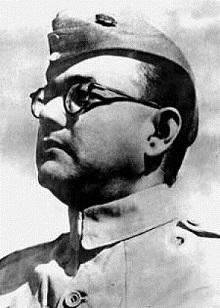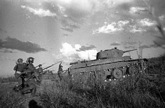Did Netaji escape to the Soviet Union?
 |
| Netaji Subhas Chandra Bose. Source: wikipedia.org |
Netaji Subhas Chandra Bose remains one of the most controversial and enigmatic figures in Indian history. Since scholars of various dispositions have devoted years to studying his life, there have been many debates about the personality of this extraordinary man.
Netaji’s death is shrouded in mystery, the cause of which, according to the official version, was a plane crash in Taiwan in August 18, 1945.
Many researchers have noted the unreliability of this version, built on contradictions and not confirmed by official documents. However, neither the Indian government nor the authorities of other countries, which somehow or other can be linked to Bose’s disappearance, are interested in conducting a detailed investigation of this case.
Politicians tend to be very reluctant when talking about Netaji’s alleged death. It is the refusal of the Indian authorities to provide any official information that made the work of the Shah Nawaz (1956) and Khosla (1970-1974 ) committees, which studied the “mystery of Subhas Chandra Bose” futile. The Mukherjee Commission operating in 1999-2006, which the Taiwanese government agreed to cooperate with, got seemingly close to the truth: it was found that Bose did not die in a plane crash, and “Netaji’s ashes,” which are stored in a Tokyo temple Renkodzhi, were really not his. However, the Indian parliament considered the commission’s report “not sufficiently plausible” having refused to consider the data it contained. The Government of India has also so far failed to publish the archive information (33 “secret documents”) related to Bose, despite persistent requests from the Mission Netaji volunteer organization and the famous leader’s descendants.
Conspiracy theories
This “silent” position of the state and the not too convincing official version gave rise to a multitude of different assumptions and theories about Subhas Chandra Bose’s fate, many of which look fictional and absurd. For example, some not quite competent enthusiasts are trying to present Netaji as a German or British (!) agent, who fled to Europe after the war.
Then there is a version that says the Indian National Army (INA) leader was murdered by the British or Japanese, who were under pressure from the British. Why would the British, especially if they had leverage over the Japanese, destroy their opponent instead of arresting the ‘declared war criminal?’
Typically, these theories are not based on anything other than unreliable evidence of “witnesses,” assumptions and conjectures.
Netaji in the Soviet Union
Among all of these versions, one attracts special attention. It states that Subhas Chandra Bose was in the Soviet Union in 1945. At a first glance, this assumption stands out for its exoticism. Indeed, how could the Indian political leader, who was collaborating with the fascist and militarist regimes, find refuge in the Soviet Union? However, it is not as simple as that. Another peculiarity of this version is that it was supported not only by the social activists and lovers of conspiracy theories. One of the most consistent supporters of the “Soviet” version is Purabi Roy, a professor of Calcutta University and prominent Indian academician. Among those who agree with her are Indian and Russian scientists, former members of the secret services and even Netaji’s descendants. Can all these people believe unfounded rumours so easily or succumb to naive romantic sentiments? Highly unlikely!
So, what are the main arguments of the adherents of this version? One of them is that Subhas Chandra Bose, although he tried to cooperate with Hitler and Mussolini and also acted in alliance with the Japanese, was not a follower of the Nazi ideology. This is supported by his own writings in the 1930s. Netaji noted the effectiveness of the German and the Italian governments, but decried the racist regimes in those countries. The Indian politician was much more sympathetic towards the Soviet socialist system. He claimed that it was the Soviet type of economy and government structure as well as the socialist ideology that would be invaluable to India in the first decades after gaining independence. As it turns out, an “ideological divide” with the USSR was out of question.
Secondly, during the war Netaji had never participated in the fighting against the Soviet Union. On the contrary, after escaping from India in 1941, he sought help from Moscow, but the Soviet Union, an ally who had ties with the UK, was forced to refuse the Indian patriot asylum. Nevertheless, Bose was granted free travel to Europe through Soviet territory. In the summer of 1941, Netaji was shocked by the German attack on the Soviet Union; he considered it a terrible mistake. This was one of the reasons for his subsequent break-up with the German Nazis and his departure to Japan. Even in 1944, Bose, while in Tokyo, was trying to make contact with the Soviet embassy. Consequently, Subhas Chandra Bose had never been an enemy of the Soviet Union.
Moreover, one should consider Netaji’s other options in August 1945, after Japan’s and INA’s crushing defeat. It is clear that staying in Southeast Asia, was for him tantamount to suicide – he was hardly capable of escaping from the British troops while he was in that territory. The prospect of his departure to the recently capitulated Japan looked a little better, but it would have been unlikely for Tokyo to harbour a former ally and risk the wrath of those who won the war.
The Asia-Pacific region as a whole was the most dangerous place to stay for Bose in the conditions of complete dominance of the Anglo-American forces. The UK authorities declared Netaji a war criminal, and therefore, his emigration to Europe and his stay there were also impossible.
There was only one place left for Bose - the USSR. Of course, Bose knew that it was unlikely for him to be welcomed in the USSR, but even surrendering to the Soviet side, which was not interested in taking him to a tribunal, was preferable to facing British wrath
Perhaps Bose’s “experience” of defecting to the Soviet Union in 1941 played a role. Then Netaji, disguised as a Pathan, was able to enter the territory of Afghanistan, and from there he reached the Soviet border. Bose could have followed the same route in 1945, while faking his own death in a plane crash.
The declassified documents from the archives of British intelligence, which express concern about Bose’s possible defection to the USSR, are also in favour of the “Soviet” version. Even India’s then-viceroy Wavell, expressed similar concerns in 1945, and the “Note to Fisher” (1946) cites the opinion of Italian diplomat Pietro Quaroni, who said Bose escaped. Incidentally it was the same diplomat who helped Netaji organise his 1941 escape to the USSR.
All this, as well as the extremely contradictory statements made by Netaji’s associates (Captain Lakshmi, for example) and the alleged witnesses to his death and the absence of documentary evidence of the plane crash suggest that Bose's escape to the Soviet Union might well have been accomplished.
What do this version’s followers think about Netaji’s life in the USSR? They have no consensus about this. Some believe that the Indian hero ended his life in Siberian camps; others suggest that he may have been killed on the orders of the Soviet authorities. Neither of the scenarios is convincing.
Joseph Stalin had relatively tense relations with Jawaharlal Nehru and could hardly miss an opportunity to influence him. Keeping Bose under his control could have been a nice trump card to use against India’s first prime minister.
Finally, according to another view, that some researchers hold, Bose was able to return to India, where he lived under a fictitious name for years. Several sanyasis were possible “candidates” for the role of the returned Netaji (eg: Bhagwanji of Faizabad, who died in 1985).
However, if that's true, why did the proud independence fighter not reveal himself, even though the threat of arrest and trial had passed long ago?
Of course, the theory described, as well as many others, cannot provide answers to many questions. On the other hand, judging by the fairly logical and reasonable arguments of its supporters, there are good reasons for research in this area. It is hoped that under pressure from the public, which is yearning for truth, governments involved with Subhas Chandra Bose’s case will eventually dare to publish the information they have. And, perhaps, the veil of mystery will slightly open.
All rights reserved by Rossiyskaya Gazeta.
Subscribe
to our newsletter!
Get the week's best stories straight to your inbox

